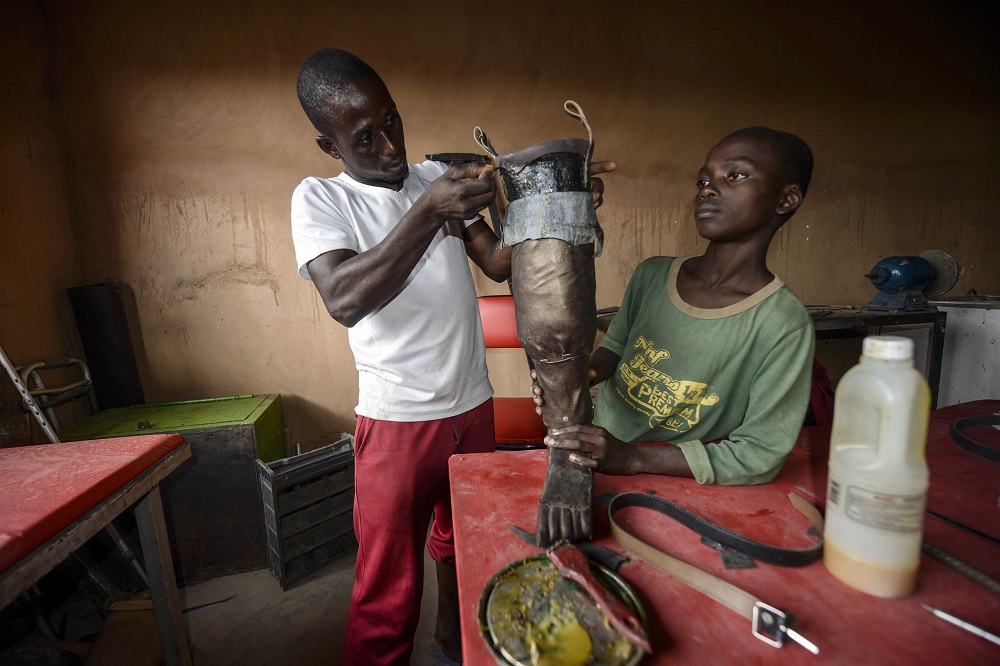COMMENT
Much of my life has been spent working to eradicate polio, a crippling and vaccine-preventable disease. This was a feat once considered impossible – even just a few years ago, Nigeria accounted for more than half of all polio cases worldwide. But last July, against all odds, we celebrated our first anniversary of being polio-free. A month later, the African continent reached the same goal. Today, polio is endemic in only Afghanistan and Pakistan. This is a great public health achievement, one that we should carry with pride.
Although the struggle against polio is not over – the African region must protect its progress against the disease through to July 2018 to be officially certified polio-free – there are important lessons to be learned.
1. Governments must lead the way
It is difficult to make progress on a national scale without strong political will and significant financial investments from the government. When we saw unacceptably high numbers of children being paralysed by polio, the government rose to the challenge by affirming its commitment to eradicating the disease – President Muhammadu Buhari publicly vaccinated his own grandchild and, just as critically, the government increased funding for the polio vaccination programme.
2. Local leaders and civil society must be involved from the start
For future public health campaigns to be successful across the African region, local leaders must be part of the process from day one.
Successful health campaigns require people’s understanding and trust – it does not take long for fearful whispers about vaccines to turn into rumours running rampant with conspiracy theories.
Seeking support from local leaders who are trusted by their communities is essential to building trust in health campaigns and addressing misconceptions about life-saving vaccines.
Just over a decade ago, we experienced boycotts against vaccinations. Parents refused to allow their children to be immunised, citing distrust of the vaccines and the health workers.
In response, the Nigerian government turned to the religious, traditional and local leaders whom parents did trust, and worked closely with them to change the perception of vaccines in local communities.
These were not passive efforts and the results speak for themselves: the vast majority of parents in most areas of Nigeria have allowed their children to be immunised against the disease when asked to by health workers.
3. People must take ownership of campaigns
Residents must not only trust the health workers knocking on the doors of their homes, but also be empowered with the knowledge and resources to take ownership of these campaigns.
There are more than 200 000 health workers who have worked tirelessly to vaccinate more than 45 million children against polio. About 1 300 of these heroes are polio survivors and are now dedicated to serving as polio vaccine ambassadors in the areas where they live. In addition, there are more than 12 000 other volunteers, many of them women in trusted positions such as teachers or traditional birth attendants, who go home-to-home to educate mothers about the importance of polio vaccines, routine immunisation, nutrition and sanitation. Ownership builds trust, increases involvement and promotes a sense of responsibility in the local population.

4. Health systems must be ready to respond
To achieve universal vaccine access, health systems must be able to identify risks and co-ordinate responses as quickly and effectively as possible. This is particularly important in the face of insecurity and conflict when access to some areas can be difficult and dangerous.
In Nigeria, the polio programme responded to such challenges by setting up immunisation facilities at major transit points and providing basic health services at health camps for displaced families, among other interventions to access hard-to-reach populations.
Nigeria also established emergency operations centres in high-risk states to co-ordinate vaccination activities and respond rapidly to outbreaks. The centralised control centres were so critical to Nigeria’s success against polio that the model has been copied in Afghanistan and Pakistan. They were also used to co-ordinate a swift and effective response to the Ebola outbreak in Nigeria in 2014, saving countless lives.
Building systems that are able to adapt and respond quickly to all diseases – and that establish clear roles and accountability mechanisms – are critical to ensuring that we protect the health of children at all times, even in the most unexpected or daunting of circumstances.
A growing Lassa fever outbreak in Nigeria, which has led to more than 100 deaths since August 2015, shows the need to take full advantage of this infrastructure to respond to new challenges.
5. Investment should be aimed at lasting solutions
Ending a disease is expensive, so it is important to invest wisely in solutions that will last. The knowledge, resources and infrastructure built up over decades to end polio in Nigeria will continue to prove useful in protecting children from other diseases.
For example, polio workers in Nigeria have been trained to provide other critical health services such as routine immunisations and nutritional supplements, ensuring that children are reached with not only polio vaccines but also other life-saving services.
The global efforts to stop polio have also helped to bolster countries’ abilities to conduct surveillance for diseases and closely monitor outbreaks, as well as identify missed children and ensure that they are visited by health workers. This will not only benefit children today, but also protect future generations.
Investing in local populations, strong leaders, health workers and health systems allowed us to turn a challenge once considered impossible into one of many milestones in Nigeria’s – and Africa’s – history.
It is now time to apply these lessons from the polio journey toward the challenge at our feet: ensuring that every last child across the continent receives all of the vaccines they need.
This is a truly monumental goal, but we’re not starting from scratch. Africa has made her promise. Let’s achieve it.
Dr Oyewale Tomori is the president of the Nigerian Academy of Science
This piece was originally published on March 1 2016.